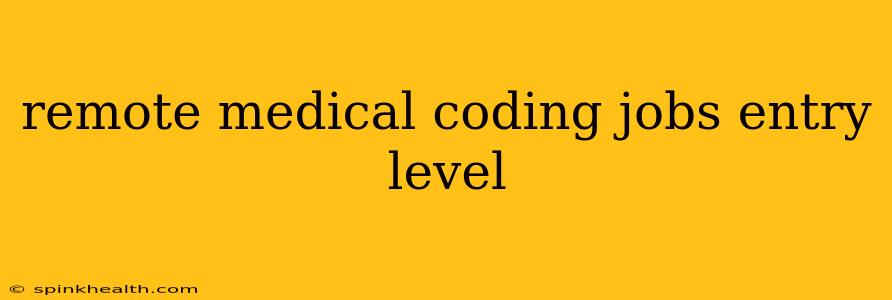The hum of the computer, the quiet satisfaction of deciphering medical jargon, the flexibility of working from home – this is the allure of a remote medical coding job. But breaking into this field, especially at the entry level, can feel like navigating a complex medical chart itself. This guide unravels the mystery, offering insights and strategies to help you land your dream remote position.
My journey into the world of medical coding began with a simple fascination. I was always intrigued by the intricate details of medical records and the precision required to translate them into standardized codes. The ability to contribute to accurate healthcare billing while working remotely was the icing on the cake. Now, I want to share my experiences and knowledge to help you on your path.
What is Medical Coding?
Medical coding is the process of transforming healthcare diagnoses, procedures, and services into standardized alphanumeric codes. These codes are used for billing, insurance claims processing, and maintaining accurate healthcare data. Think of it as translating medical language into a universal code that insurance companies and healthcare facilities can understand. It’s a crucial role in keeping the healthcare system running smoothly.
What Skills Do I Need for Entry-Level Remote Medical Coding Jobs?
While formal education is often preferred, many entry-level positions value a combination of skills and a willingness to learn. This includes:
- Strong attention to detail: Accuracy is paramount in medical coding. One wrong code can have serious consequences.
- Medical terminology knowledge: Understanding medical terms is essential for accurately interpreting patient records.
- Computer proficiency: You'll be working with coding software and electronic health records (EHRs).
- Analytical skills: You’ll need to analyze medical documentation to identify the correct codes.
- Excellent communication skills: While working remotely, clear communication with colleagues and clients is critical.
How Do I Find Remote Medical Coding Jobs?
The digital age offers numerous avenues for finding remote opportunities:
- Online job boards: Websites like Indeed, LinkedIn, Monster, and FlexJobs specialize in remote positions.
- Company websites: Check the career pages of healthcare organizations, billing companies, and medical coding outsourcing firms.
- Networking: Connecting with professionals in the field through online forums, LinkedIn groups, or professional organizations can lead to hidden job opportunities.
What Certifications or Education Are Needed?
While not always mandatory for entry-level positions, certifications like the Certified Professional Coder (CPC) or Certified Coding Specialist (CCS) demonstrate competence and can significantly boost your chances. Associate's or bachelor's degrees in health information technology (HIT) or related fields are also beneficial, but not always required for entry level positions.
What are the Challenges of Remote Medical Coding?
While the flexibility of remote work is attractive, be aware of the potential challenges:
- Isolation: Working remotely can be isolating, so maintaining connections with colleagues is crucial.
- Time management: Effective self-discipline and time management are essential for success.
- Technology issues: Reliable internet access and technical support are critical.
Can I Get a Remote Medical Coding Job Without Experience?
Yes, many companies offer entry-level positions that provide on-the-job training. Highlight your transferable skills (attention to detail, analytical abilities, computer skills) and your eagerness to learn in your application. Internships or volunteer work in related fields can also provide valuable experience.
What is the Salary Range for Entry-Level Remote Medical Coding Jobs?
Salary varies depending on location, experience, and certifications. However, entry-level positions typically offer a competitive salary, often starting around $35,000-$45,000 per year.
What is the future of remote medical coding jobs?
The demand for medical coders is projected to grow significantly in the coming years, with remote work options expected to continue expanding. This field provides a stable and rewarding career path with good opportunities for advancement.
This is just the beginning of your journey into the world of remote medical coding. By honing your skills, pursuing relevant certifications, and actively searching for opportunities, you can unlock a fulfilling and flexible career. Remember to stay updated on industry trends and continuously expand your knowledge. Your coding skills will be in high demand, so embrace the challenge and begin building your future today!

